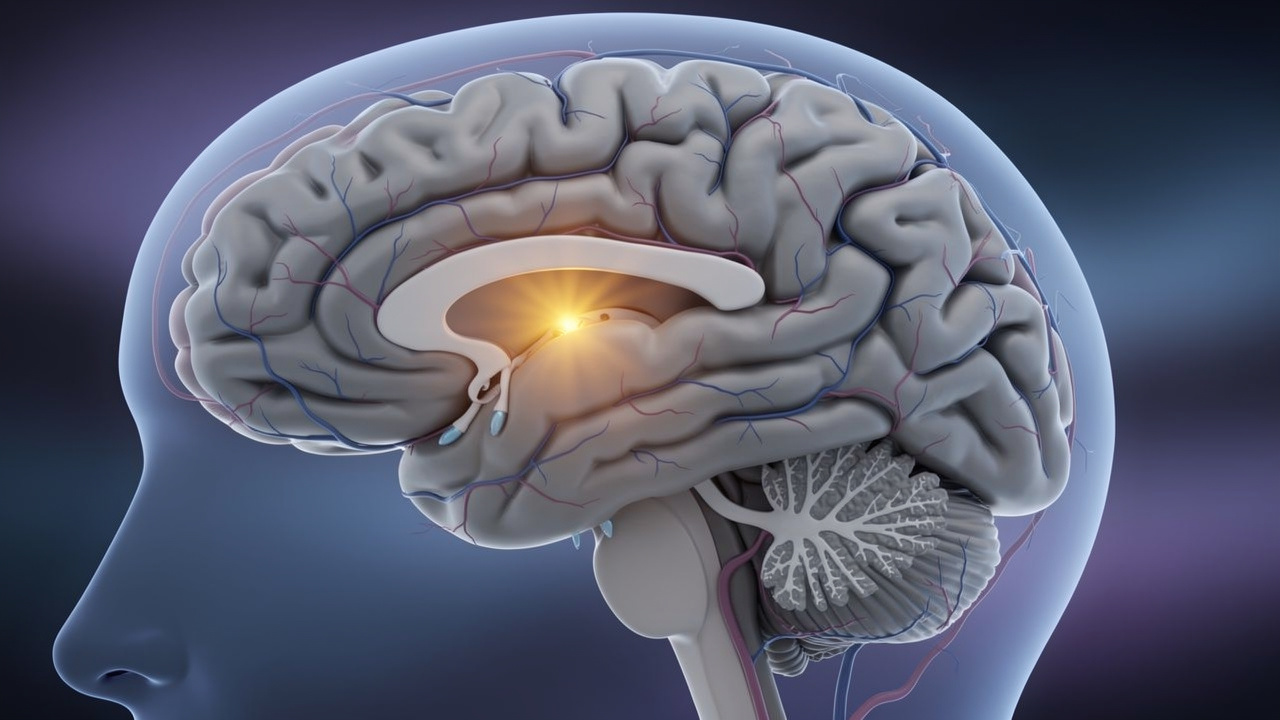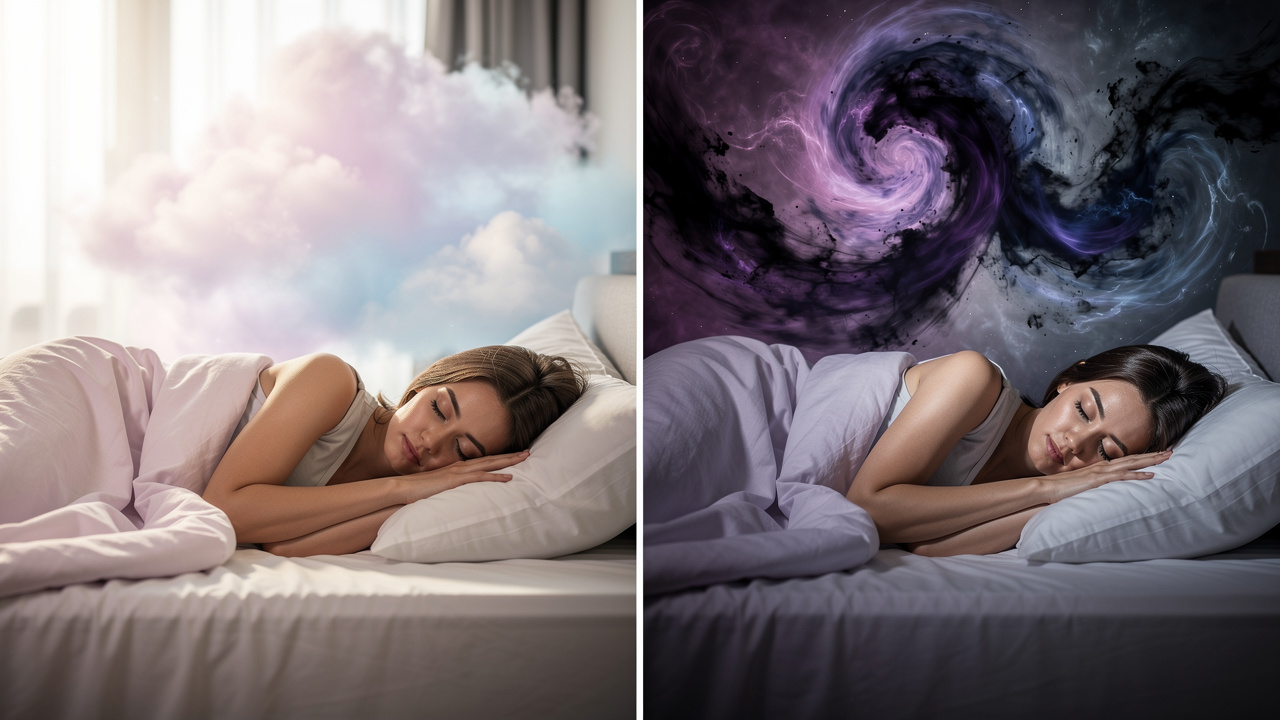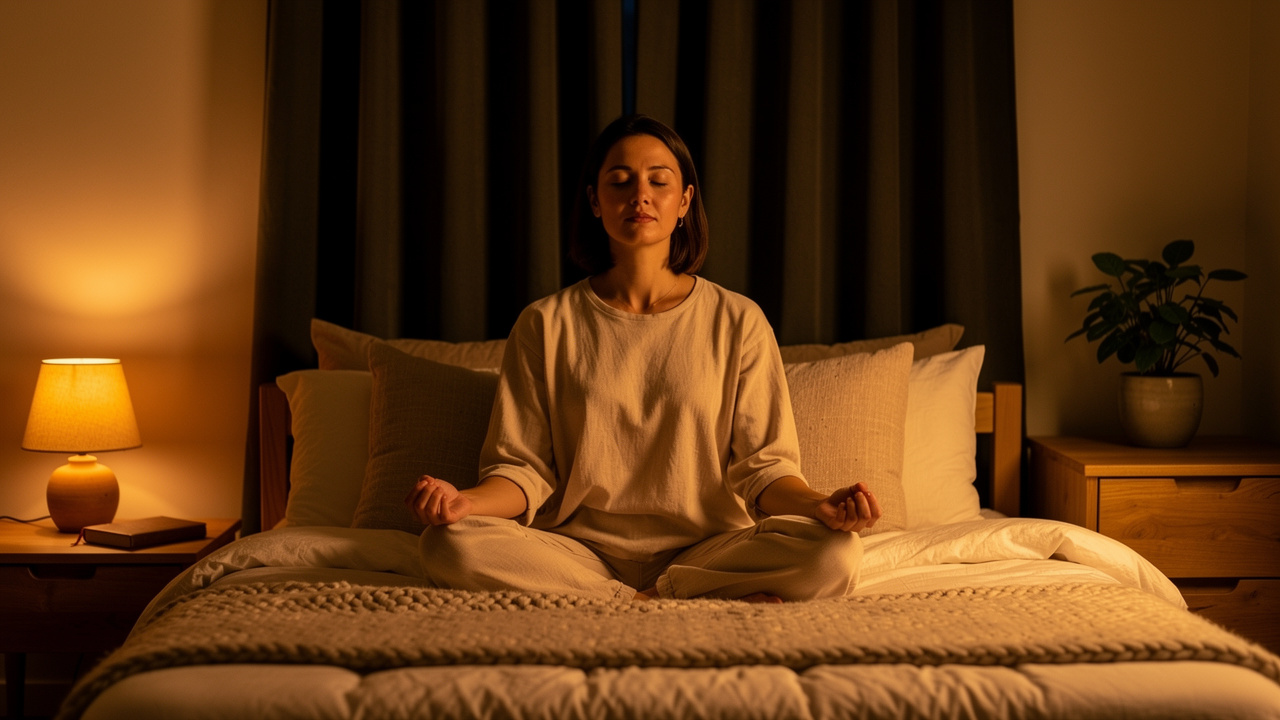Does Melatonin Cause Nightmares?
If you’ve ever asked yourself, “does melatonin cause nightmares?”, you’re not alone. For many high performers, biohackers, and recovery-focused athletes, melatonin seems like a simple way to smooth out sleep. Then the vivid dreams hit—sometimes crossing the line into full-on nightmares—and the supplement suddenly feels less straightforward.
This guide breaks down what the science actually says about melatonin and nightmares, how melatonin changes your sleep architecture, who’s most at risk, and how to adjust your protocol without sacrificing deep, restorative sleep.
How Melatonin Works In Your Brain

Melatonin is a hormone your brain produces in the pineal gland. Think of it as your internal “lights out” signal. As daylight fades, your brain ramps up melatonin production; as light returns, production drops.
Melatonin:
-
Helps synchronize your circadian rhythm (your 24-hour sleep–wake cycle)
-
Lowers core body temperature slightly to prepare for sleep
-
Signals that it’s time to shift away from wake-driven neurochemistry
Endogenous melatonin levels start rising a couple of hours before your habitual bedtime, peak during the night, and fall toward morning. Supplemental melatonin plugs into this same system, which is why timing and dose matter so much.
What Disrupts Your Natural Melatonin Rhythm
Modern life can easily throw this system off. Several factors can blunt or shift melatonin release:
-
Stress and late-night rumination
-
Shift work or irregular schedules
-
Blue light exposure from phones, tablets, and laptops in the evening
-
Smoking and other stimulants, especially close to bedtime
-
Lack of natural daylight exposure during the day
When this rhythm is disrupted, people often reach for supplements to “correct” the problem. That’s where the question “does melatonin cause nightmares?” tends to show up—because you’re intervening in a tightly tuned system.
Does Melatonin Cause Nightmares? What The Research Shows

The direct answer to “does melatonin cause nightmares?” is: not consistently, and not for everyone. But it can change your dream experience in ways that some people find intense or disturbing.
Here’s what the evidence suggests:
-
Many users report more vivid dreams or occasional nightmares after starting melatonin.
-
Controlled studies are limited and results are mixed.
-
Some research finds increased dream recall without a clear change in how negative the dreams are.
-
Other studies show better sleep quality on melatonin, with no meaningful increase in nightmares.
One study in Sleep Medicine found that melatonin increased how often people remembered their dreams but didn’t significantly change the emotional tone of those dreams. That hints at an important distinction: melatonin may make dreams more noticeable, even if it isn’t directly “creating” bad dreams.
So when people ask “does melatonin cause nightmares?”, what they’re often noticing is a combination of:
-
More REM sleep (where most dreams happen)
-
More dream recall
-
Pre-existing stress or anxiety that shapes dream content
How Melatonin Might Influence Nightmares
Even though the data is not definitive, there are several plausible mechanisms that could connect melatonin with nightmares in certain people.
1. More Time Spent In REM Sleep
Nightmares almost always occur during REM (rapid eye movement) sleep, the stage where:
-
Brain activity looks closer to wakefulness
-
Muscle tone is largely paralyzed
-
Dreaming is most frequent and vivid
Supplemental melatonin can:
-
Lengthen total sleep time
-
Shift the structure of sleep in favor of more REM later in the night
If you spend more minutes in REM, you increase your opportunities to dream—and to have nightmares. For someone already under stress, this change can make unpleasant dreams more noticeable and frequent.
2. Vasotocin And REM Regulation
When melatonin rises at night, it also triggers the release of a peptide called arginine vasotocin, which helps regulate REM sleep.
The theory:
-
Higher or sustained melatonin levels → more vasotocin
-
More vasotocin → changes in how much time you spend in REM and how stable that REM is
-
More or deeper REM → more intense dream experiences
This doesn’t prove that melatonin “causes” nightmares, but it offers a biological route by which it might intensify dreaming for some users.
3. Stress, Insomnia, And Confounding Factors
The question “does melatonin cause nightmares?” often ignores a key confounder: why you’re taking it in the first place.
Many people start melatonin because of:
-
High stress
-
Anxiety
-
Shift work
-
Jet lag
-
Changes in training load or recovery demands
These same factors are independent drivers of nightmares. If your brain is already processing heavy emotional or physical stress, more REM time can simply amplify what was already there.
In practice, this means:
The melatonin may not be the root cause of the nightmares—it may just be turning up the volume on existing issues.
4. Memory Processing And Vivid Dream Content
Emerging research suggests melatonin and its breakdown products may influence memory consolidation. Since dreams are thought to help process recent experiences, anything that alters memory pathways could also alter dream intensity and content.
This line of research is early, but it reinforces the idea that melatonin is not just a “sleep switch.” It’s part of a complex brain system that also affects how you process and store experiences—fuel for vivid dreams, both good and bad.
Who Is More Likely To Get Nightmares From Melatonin?
Not everyone who supplements will even ask “does melatonin cause nightmares?” because many people never notice a problem. Based on current evidence and clinical experience, nightmares are more likely if:
-
Your dose is high
Doses above 3 mg—especially 5–10 mg and beyond—are linked to more side effects, including vivid dreams. Many people do well on far lower doses (0.3–1 mg). -
You already have frequent nightmares
If nightmares are part of your baseline, extra REM time can bring them out more often. -
You’re under heavy psychological or physical stress
Athletes deep in a training block, entrepreneurs running on adrenaline, and anyone in a high-stress phase are all primed for intense dreams. -
You’re very sensitive to medications or supplements
Some people simply respond strongly to any neuroactive compound, melatonin included. -
You shift schedules often
Frequent time zone changes or rotating shifts mean your circadian system is already strained. Melatonin can help, but it also changes sleep stages while your brain is still adapting.
Other Side Effects Of Melatonin To Keep On Your Radar
While the main focus here is “does melatonin cause nightmares?”, it’s worth knowing the broader side-effect profile so you can interpret what you feel more accurately.
Common Side Effects
Most common reactions are mild and short-lived:
-
Daytime drowsiness or “melatonin hangover”
-
Headaches
-
Dizziness or lightheadedness
-
Nausea or mild stomach upset
-
Restlessness or agitation in some people (especially children)
Less Common Or More Serious Effects
Less frequent, but reported in the literature:
-
Vivid dreams or nightmares
-
Short-term mood shifts (low mood, mild anxiety, irritability)
-
Abdominal cramps, loose stools, or constipation
-
Reduced alertness and mental sharpness
-
Low blood pressure in some users
-
Reduced appetite
-
Nocturnal urinary incontinence, particularly in older adults
-
Higher risk of falls due to dizziness or grogginess
-
Lowered seizure threshold in people with seizure disorders
Because of the drowsiness and reduced alertness, you should avoid driving or operating machinery within about five hours of taking melatonin.
Safety, Dosing, And Supplement Quality

Beyond the question “does melatonin cause nightmares?”, there are real concerns about how people take it and what they’re actually getting in the bottle.
How Much Melatonin Do You Really Need?
For most adults:
-
A starting dose of 0.3–1 mg taken 60–90 minutes before bed is often enough.
-
Many clinical protocols land in the 1–3 mg range.
-
Higher doses rarely improve sleep quality and often increase side effects, including intense dreams.
More is not better here. If you’re asking “does melatonin cause nightmares?” and you’re on a high dose, your first move should almost always be to bring the dose down.
Why Supplement Quality Matters
In the US, melatonin is regulated as a dietary supplement, not a drug. This raises important questions about whether melatonin is safe, especially given inconsistent product quality and dosing variability that may contribute to unexpected side effects including nightmares. That means:
-
The FDA does not tightly control content or purity before products reach shelves.
-
A 2017 study of commercial melatonin products found:
-
71% did not contain a melatonin amount within 10% of the label claim.
-
Actual content ranged from 83% less to 478% more than labeled.
-
Over a quarter of products contained serotonin, which is not listed on the label and can be risky at higher doses.
-
To reduce variability and side-effect risk:
-
Look for third-party tested products, such as those with a USP or similar verification mark.
-
Avoid megadoses unless specifically directed by a clinician.
-
Be consistent with your brand and form so you can interpret your response accurately.
Lower-Dose, Fast-Onset Options: Melatonin Nasal Spray
One strategy for people who are sensitive to melatonin—or who are worried about “does melatonin cause nightmares?”—is to use lower, more precise doses that still provide reliable onset.
A nasal spray format can:
-
Deliver melatonin rapidly through the nasal mucosa
-
Allow you to stay at a lower microdose range while still feeling an effect
-
Minimize total exposure compared with large oral doses
For example, our Melatonin Nasal Spray is designed around this principle: efficient delivery at a controlled, lower dose, rather than flooding the system with high oral milligram amounts.
What To Do If Melatonin Seems To Trigger Nightmares

If you’re already experiencing disturbing dreams and wondering “does melatonin cause nightmares for me personally?”, here’s a structured way to test that safely.
Start with small, single-variable changes and track what happens.
-
Cut The Dose
Drop to the lowest available dose (or split your tablet if appropriate). Many people find that nightmares fade when they move from, say, 5 mg down to 0.5–1 mg. -
Move The Timing Earlier
Try taking melatonin 1.5–2 hours before bed instead of right before lights out. This gives your brain time to shift before deep REM-heavy cycles later in the night. -
Use It For Specific Situations, Not Nightly By Default
Reserve melatonin for:-
Jet lag
-
Occasional night shifts
-
Short-term circadian resets
Rather than as a permanent nightly crutch.
-
-
Dial In Your Pre-Sleep Routine
Build a consistent, down-regulating routine:-
Dim lights and avoid blue light from screens
-
Light stretching or restorative yoga
-
Breathwork or a brief mindfulness session
-
Non-stimulating reading
This reduces stress-driven nightmares that may be incorrectly blamed on melatonin.
-
-
Address Background Stress And Anxiety
If you’re going through a demanding training cycle, launch, or life event, your brain will process that stress at night. Melatonin may just bring it into clearer focus. Consider targeted stress strategies: therapy, coaching, or structured recovery blocks. -
Stop Melatonin For 7–14 Days And Observe
If nightmares continue at the same intensity after stopping, melatonin was likely not the primary cause. If they fade, that answers your personal “does melatonin cause nightmares?” question more clearly.
Non-Melatonin Ways To Support Deep, Stable Sleep
If you decide melatonin isn’t the right fit—or you want to reduce your reliance on it—there are evidence-based alternatives and complements.
“Sleep is that golden chain that ties health and our bodies together.” — Thomas Dekker
Behavioral And Environmental Approaches
Before asking “does melatonin cause nightmares?”, it’s worth asking whether your sleep setup is helping or hurting you.
Focus on:
-
Regular sleep and wake times, even on weekends
-
A cool, dark, quiet bedroom
-
No heavy meals or intense training sessions right before bed
-
Caffeine cut off at least 6–8 hours before target bedtime
-
Reserving the bed for sleep and intimacy only, not work or scrolling
Cognitive-behavioral therapy for insomnia (CBT-I) has one of the strongest evidence bases for chronic sleep issues and doesn’t carry the side effects that can lead people to ask “does melatonin cause nightmares?”.
Targeted Nutrient Support
Certain non-hormonal compounds can support relaxation and sleep quality:
-
Magnesium for muscle and nervous system relaxation
-
Glycine for body temperature regulation and subjective sleep quality
-
L-theanine for calm focus and reduced pre-sleep mental noise
Magnesium is especially helpful for people who carry a lot of tension into the night, which is why we include it in our Sleep Powder. For some users, this kind of nutrient support can reduce the need for higher melatonin doses that are more likely to be associated with nightmares.
Always discuss new supplements with a clinician if you’re on medications or managing chronic conditions.
Special Situations: Children, Pregnancy, And Medical Conditions
The question “does melatonin cause nightmares?” takes on extra weight in certain groups, where safety data is more limited.
-
Children And Adolescents
Long-term effects on hormonal development are not well studied. Nightmares, agitation, and behavioral changes are more commonly reported. Melatonin for kids should always be overseen by a pediatrician or sleep specialist. -
Pregnant Or Breastfeeding Individuals
There is not enough data to confirm safety. Because melatonin is a hormone, most experts recommend avoiding supplementation unless specifically cleared by your obstetric provider. -
People With Chronic Conditions Or On Multiple Medications
Melatonin can interact with:-
Blood thinners
-
Blood pressure medications
-
Diabetes medications
-
Seizure medications
-
Certain antidepressants and other drugs metabolized by liver enzymes
If this is you, get medical input before experimenting on your own.
-
In these groups, the stakes are higher than just “does melatonin cause nightmares?”—you’re also weighing systemic effects and drug interactions.
When To Talk To A Healthcare Professional
You should bring a professional into the loop if:
-
Nightmares are frequent, intense, or disturbing, regardless of melatonin use
-
Your dreams are linked with panic, flashbacks, or trauma memories
-
You notice significant mood changes, depression, or anxiety after starting melatonin
-
You’re using melatonin nightly for months with no broader sleep strategy
-
You’re considering melatonin for a child or teenager
-
You have hypertension, autoimmune disease, seizure disorders, or are on complex medication regimens
A clinician can help determine whether melatonin makes sense for your goals and physiology, and whether your nightmares point to something deeper than a supplement issue.
Key Takeaways
-
The question “does melatonin cause nightmares?” does not have a simple yes-or-no answer.
-
Melatonin can increase REM sleep and dream recall, which can make existing stress or emotional content show up more vividly.
-
Higher doses and inconsistent product quality increase the odds of noticeable side effects, including vivid dreams and occasional nightmares.
-
Many people reduce or eliminate melatonin-related nightmares by lowering the dose, adjusting timing, and cleaning up their pre-sleep routine.
-
Alternatives like structured sleep hygiene, CBT-I, and non-hormonal nutrients (such as the magnesium in our Sleep Powder) can support deep sleep without the same risk of disturbing dreams.
-
If nightmares are persistent or severe—whether or not you’re using melatonin—loop in a qualified healthcare professional.
Used thoughtfully and at the right dose, melatonin can be a helpful tool in a broader sleep strategy. The key is understanding how it reshapes your sleep architecture, listening closely to your own response, and not ignoring the bigger picture behind the question: does melatonin cause nightmares for you?




Leave a comment
All comments are moderated before being published.
This site is protected by hCaptcha and the hCaptcha Privacy Policy and Terms of Service apply.